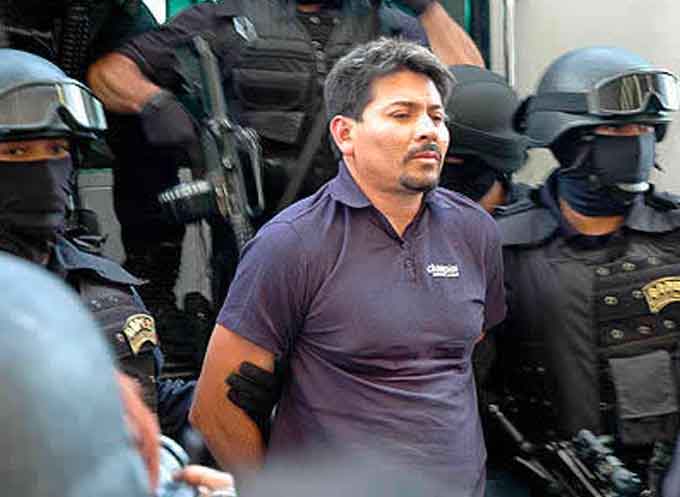
The leader of the ‘La Familia Michoacán’ (LFM) Mexican drug cartel was sentenced Wednesday by U.S. District Judge Ed Kinkeade to serve more than 43 years in federal prison and fined $5 million for offenses related to his leadership role within LFM.
LFM was responsible for trafficking thousands of kilograms of methamphetamine into the United States and delivered to stash locations in North Texas and elsewhere.
This sentence was announced by U.S. Attorney Erin Nealy Cox of the Northern District of Texas.
This case was investigated by the Drug Enforcement Administration (DEA), Dallas Police Department, Garland (Texas) Police Department and the Texas Department of Public Safety.
The following agencies provided special investigative assistance: U.S. Marshals Service, U.S. Customs and Border Protection, and U.S. Immigration and Customs Enforcement’s (ICE) Homeland Security Investigations (HSI).
The Department of Justice’s Office of International Affairs also assisted in the extraditing the defendant to the United States to face charges.
The government of Mexico assisted in this investigation, and in securing the extradition of the defendant to the United States.
Arnoldo Rueda-Medina, aka ‘La Minsa,’ 48, pleaded guilty in September 2017 to one count of conspiracy to possess with the intent to distribute a Schedule II controlled substance and one count of conspiracy to launder monetary instruments.
Judge Kinkeade sentenced Rueda-Medina to 520 months in federal prison on the drug conviction and 240 months in federal prison on the money laundering conviction, to run concurrently.
Rueda-Medina was arrested in Michoacán, Mexico, on July 11, 2009, and was extradited to the United States on Jan. 27, 2017.
(Police in Mexico arrest a drug gang member after two days of attacks on federal police stations. Arnoldo Rueda a suspected Mexican gang leader is escorted by police in Michoacan. Courtesy of NTDTV and YouTube. Posted on Jul 13, 2009)

“Thanks to the unrelenting efforts of our United States law enforcement team and the critical assistance and sacrifice of our Mexican counterparts, a notorious drug cartel leader is where he should be — behind bars,” said U.S. Attorney Nealy Cox.
“My office will continue to devote our time, energy, focus and expertise to helping disrupt and dismantle transnational criminal organizations with our law enforcement partners in the United States and abroad to stem the flow of deadly drugs into our country and stop the violence inflicted by people like Rueda-Medina.”

“High ranking cartel figures operating in the North Texas area will not be tolerated,” said Drug Enforcement Administration (DEA) Special Agent in Charge Clyde E. Shelley Jr..
“The DEA and the US Attorney’s Office are working around the clock to combat the massive amount of drugs brought into the United States as a result of the direct actions of Arnoldo Rueda-Medina, aka “La Minsa,” and the continuing threat posed to our communities by the remnants of the LFM.”
On Feb. 25, 2010, the U.S. Department of the Treasury sanctioned Rueda-Medina under the Foreign Narcotics Kingpin Designation Act (Kingpin Act) for his involvement in drug trafficking.
The Kingpin Act blocks all property and interests in property, subject to U.S. jurisdiction, owned or controlled by significant foreign narcotics traffickers, as identified by the President.
The Act also prohibits U.S. citizens and companies from doing any kind of business activity with Rueda-Medina; and it virtually froze all of his assets in the United States.
According to plea documents, from September 2007 through Oct. 21, 2009, Rueda-Medina held a leadership position within LFM, a Mexican drug cartel and organized crime syndicate based in the Mexican State of Michoacán.
LFM was responsible for trafficking methamphetamine into the United States through border checkpoints near Laredo, Texas, and Tijuana, Mexico.
(Learn More. Law enforcement can more effectively collaborate to form a force multiplier of resources and capabilities in the ever-expanding global world of crime. Homeland Security Investigations (HSI) bridges the gap. HSI has the ability to follow the “pipeline” and to proactively pursue the larger networks of illicit activities. HSI can serve as a force multiplier from anywhere domestic; from Minot, ND to New York City – to almost anywhere around the world with our international partners, either through the Transnational Criminal Investigative Units (TCIU’s) – which expand HSI’s footprint and enhance cooperation between partner nations and the United States. Courtesy of IACP and YouTube)
Rueda-Medina was arrested on July 11, 2009, by Mexican law enforcement.

On the same day as a response to the capture of Arnoldo Rueda, La Familia launched the biggest attacks in the history of organized crime against Federal Police and Military installations in 8 cities in the western part of Mexico.
Even attacking the Federal Police building where Arnoldo was held in. Cartel hitmen were reported using fragmentation grenades, AK-47’s and AR-15’s.
Three Federal Police officers, two soldiers were reported killed and 18 wounded.
In response, law enforcement deployed personnel to various locations throughout the state of Michoacan.
On July 14, the bodies of 12 Federal Police officers that were investigating criminal activity in the area were found tortured, murdered and abandoned along a highway between Lázaro Cárdenas and Morelia.
A note found at the scene where the bodies were dumped stated “Vengan por otro, los estamos esperando” (“Come for another, we are waiting for you”).

At least four other officers and two Mexican Marines were killed by LFM operatives responding to the arrest of Arnoldo Rueda-Medina. Several others were wounded.
According to plea documents, LFM used a sophisticated network of individuals in Mexico and the United States to distribute the methamphetamine in the Dallas-Fort Worth area and to collect proceeds from the methamphetamine sales.
The drug proceeds that were collected were delivered to cartel members or associates in Mexico either by bulk cash smuggling in vehicles utilized by LFM couriers or through money remitters such as Western Union.
This case resulted from the ongoing efforts by the Organized Crime Drug Enforcement Task Force (OCDETF), a partnership that brings together the combined expertise and unique abilities of federal, state and local law enforcement agencies.
The principal mission of OCDETF program is to identify, disrupt, dismantle and prosecute high-level members of drug trafficking, weapons trafficking and money laundering organizations and enterprises.
OCDEFT and Narcotics Section Chief Assistant U.S. Attorney Rick Calvert and Assistant U.S. Attorney George Leal prosecuted this case.

















